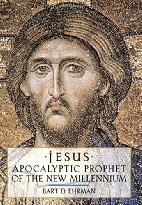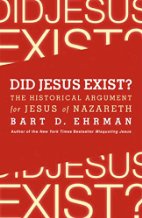 Richard Horsley on Bart Ehrman’s Jesus, apocalyptic prophet of the new millennium:
Richard Horsley on Bart Ehrman’s Jesus, apocalyptic prophet of the new millennium:
In a presentation intended for a wide audience, Bart Ehrman basically reverted to Schweitzer’s century-old picture of Jesus as a “Jewish apocalypticist.” . . . Ehrman either ignored or dismissed much of the scholarship [since Schweitzer]. . . .
Prophet Jesus and the Renewal of Israel, Kindle Version, pp. 25-26
Rafael Rodríguez on Bart Ehrman’s Jesus before the gospels: how the earliest Christians remembered, changed, and invented their stories of the Savior —
Ehrman too often relies on insinuation and unanswered rapid-fire rhetorical questions that are framed so as to make disagreeing positions seem unreasonable, when often enough the questions themselves are problematic (e.g., pp. 24–25). This . . . is usually a sign that [an] argument is not as clear or as precise as [one] would like it to be. “You don’t really think such-and-such, do you?” is not a helpful historical argument, even if it is often effective, and Ehrman retreats to this rhetorical device too often.
More problematic, in my view, is Ehrman’s dependence on sources. He reveals to his readers that, “[f]or about two years now I have spent virtually all my free time doing nothing but reading about memory” (p. 2), but his citation of memory studies seems to me rather anemic. . . . The majority of [memory studies he does cite] he cites only once, and on more than one occasion those citations are misleading (e.g., he cites Schwartz’s approbation of Maurice Halbwachs’s claim that memory adapts the past to “the beliefs and spiritual needs the present” [p. 7, citing Schwartz, Abraham Lincoln and the Forge of National Memory, 5] without mentioning that Schwartz also critiques Halbwachs on this very point . . . Perhaps even more problematically still, Ehrman engages almost none of the New Testament scholarship concerned with memory. . . . There’s no mention of scholars such as Chris Keith, Alan Kirk, Anthony Le Donne, Tom Thatcher, Michael Thate, or myself. (Chris Keith is mentioned in the acknowledgements, but none of his works appear in the endnotes.) When he mentions Dale Allison, Richard Horsely (sic), or Werner Kelber, he does not address their engagement with memory studies. This is especially worrisome when Ehrman complains that New Testament scholars, as a group, have largely ignored memory studies. When Ehrman does engage media studies among New Testament scholars, he draws attention to the form critics, whose work is largely seen as out-of-date. . . . .
I do not think he has accurately grasped even the current state of memory and the New Testament.
Jesus before the Gospels: a serial review (pt. 8)
 Bradley Bowen reviewing Did Jesus Exist? The Historical Argument for Jesus of Nazareth
Bradley Bowen reviewing Did Jesus Exist? The Historical Argument for Jesus of Nazareth
. . . Ehrman has presented a FACT FREE argument for the existence of Jesus, which is completely contrary to his claim that he thinks “evidence matters” and completely contrary to his goal to pursue the historical question of whether Jesus exists “with all the rigor that it deserves and requires”. Ehrman promised devotion to evidence and he promised scholarly rigor, but what he delivered is pure BULLSHIT, at least with his argument concerning Agreements Between Seven Indendent Gospels. . .
